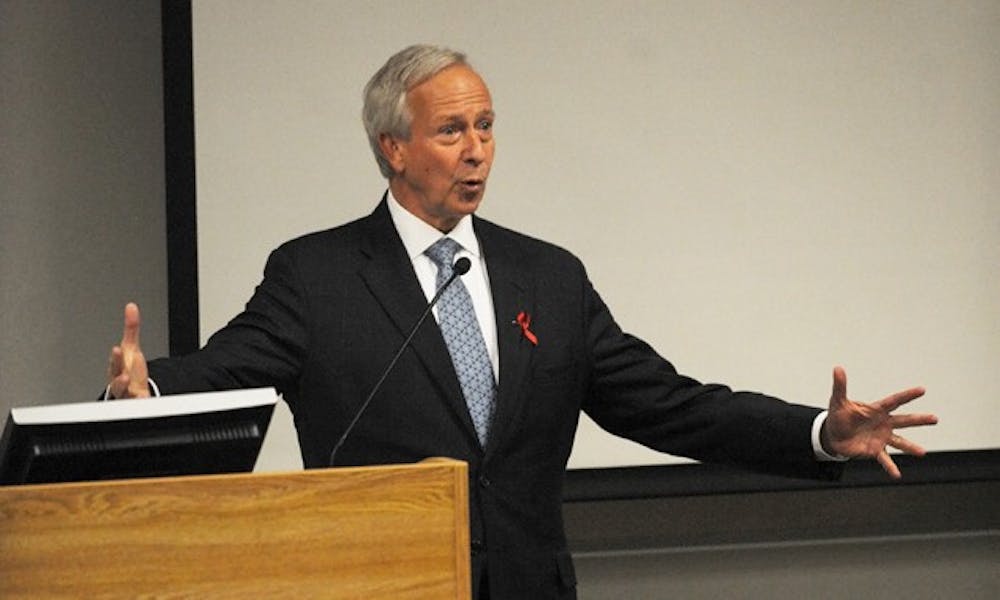The Fuqua School of Business will soon offer a Master of Management Studies degree program at Duke Kunshan University, pending Board of Trustees approval this weekend.
The Academic Council approved the MMS degree program during its final meeting of the Fall semester Thursday. Of the 56 ballots tallied, 44 faculty members voted in favor of implementing the program, but eight voted against it and four chose not to vote. The program is the first to be approved for DKU’s three-year pilot program, which will be reviewed after its initial launch. The Fuqua School of Business first proposed the degree program to the council during its Nov. 17 meeting. The program mimics the current Durham-based MMS Foundations of Business degree. Students will spend their Summer and Fall terms in Durham and head to DKU in the Spring. They expect to enroll students in the program in 2012.
“This is an exciting opportunity to extend Duke in the global direction and offer our students and faculty [the opportunity] to learn more extensively about a part of the world that will enrich their studies,” President Richard Brodhead said. “There is [a] general agreement that Duke has only one motive, and that is to provide education and quench the thirst of both faculty and students to teach and learn.”
Susan Lozier, council chair and professor of physical oceanography, emphasized that the institution of the MMS degree would be in line with the philosophies of DKU.
Some faculty members noted that cultural immersion will benefit the students but expressed concern that the social differences between the United States and China would affect the program adversely.
In response, Brodhead said even though students will have to work in a different climate than they may be accustomed to, the University will ensure that its core values will not be compromised.
“The pursuit of truth flourishes when contrary ideas are presented. The spirit of Duke has been at the heart of taking well-calculated risks, but this will not be at the cost of giving up the values of free speech,” Brodhead said.
Measures have been put in place to prevent and detect signs of any lack of intellectual freedom, said Jennifer Francis, senior associate dean for programs and Douglas and Josie Breeden professor at Fuqua.
“Students will be inculcated into the Duke in Durham experience, where every right to intellectual freedom will be practiced,” Francis said.
Francis added that student life at DKU will have similar stipulations as Duke’s Durham campus.
“Key administrators will be on campus and will live in dormitories with the students so that students will be able to approach the necessary people [if they encounter any trouble],” Francis said.
Thomas Pfau, Eads Family professor of English and professor of German, said he is concerned about Duke’s expansion into China, which contradicts decisions made by Stanford University and Columbia University not to open separate campuses in China.
“They have held reservations on the basis [of] concerns over the Chinese government,” Pfau said.
Provost Peter Lange said that although financial viability is a large component of the planning and development of DKU, more concrete data must be accumulated during its trial phase.
In other business:
Lange presented updates on other DKU and China-related initiatives currently underway.
After Duke Global Health Institute faculty approved the Master of Science in Global Health and undergraduate Global Health study abroad courses in November, the Arts and Sciences Council will assess the proposals. Lange said he expects the council will vote on additional undergraduate non-degree DKU programs—including American studies, economics and theater and film studies—in the near future.
Lange also noted that considerable progress has been made on the construction of DKU, which presently constitutes five buildings with the sixth building to start construction in early 2012.
New initiatives, such the student exchange program with Shandong University, were also discussed. This program would allow high-ranking third-year physics students from Shandong University to study in Durham with funds covered by the Chinese government, Lange said.
The next six months will prove crucial in the continued development of DKU, he said, adding that the University will search for and hire a DKU dean and vice chancellor for academic oversight of campus development.
Get The Chronicle straight to your inbox
Sign up for our weekly newsletter. Cancel at any time.

